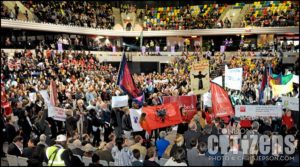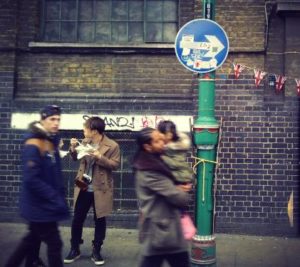 Last night saw around 6,000 people gather at the Copper Box arena in Olympic Park in Stratford for the Citizens UK London Mayoral Assembly. Front runners in the mayoral race Zac Goldsmith and Sadiq Khan were present and made encouraging commitments on housing, refugees and the Living Wage. The night also saw a fantastic presence of London Salvationists, with nearly 200 present from William Booth College and 10 London corps: Ilford, Stepney, Raynes Park, Southwark, Nunhead, Camberwell, Bromley, Wimbledon, Woodford and Mitcham. The College band played during the assembly and Captain John Clifton negotiated with Zac Goldsmith on his reaction to Citizens’ asks on Community Land Trusts. More information and reaction will be posted in the coming days, but we thought it would be good to simply share a small selection of the pictures from the assembly to remember a wonderful night: Continue reading “Pictures from the Citizens UK #MayoralAssembly last night”
Last night saw around 6,000 people gather at the Copper Box arena in Olympic Park in Stratford for the Citizens UK London Mayoral Assembly. Front runners in the mayoral race Zac Goldsmith and Sadiq Khan were present and made encouraging commitments on housing, refugees and the Living Wage. The night also saw a fantastic presence of London Salvationists, with nearly 200 present from William Booth College and 10 London corps: Ilford, Stepney, Raynes Park, Southwark, Nunhead, Camberwell, Bromley, Wimbledon, Woodford and Mitcham. The College band played during the assembly and Captain John Clifton negotiated with Zac Goldsmith on his reaction to Citizens’ asks on Community Land Trusts. More information and reaction will be posted in the coming days, but we thought it would be good to simply share a small selection of the pictures from the assembly to remember a wonderful night: Continue reading “Pictures from the Citizens UK #MayoralAssembly last night”
Month: April 2016
Living for the City
This article was first published in the March-April 2016 edition of The Officer
 By Nick and Kerry Coke
By Nick and Kerry Coke
IN 1973, within a year of our births, the great American musician Stevie Wonder released the song ‘Living for the City’ – a track from his groundbreaking new album, Innervisions. The song is startling for its howl of protest at the systemic racism of American society at the time. It traces the journey of a black family from rural Mississippi to a New York ghetto. The parents work menial jobs for poverty wages, the older brother looks for work in vain, the sister has to go to school in ill-fitting clothes and the younger brother finds himself sucked into a life of crime.
On the day of its release Wonder, blind from a young age, arranged for a group of journalists to be taken on a tour of New York City, blindfolded. He encouraged them to hear the soundscape of the city streets – the pounding of feet, car engines, police sirens and the myriad of spoken languages. As the tour ended, and still sightless, he played them ‘Living for the City’. The song opened with the trademark soul of Wonder’s voice, but as the last verse kicked in his voice transformed into an unfamiliar cry of anguish. It finished with him bellowing out these words:
I hope you hear inside my voice of sorrow
And that it motivates you to make a better tomorrow
This place is cruel nowhere could be much colder
If we don’t change, the world will soon be over
Living just enough, just enough for the city!
We recently rediscovered this song on an old vinyl record we found in a charity shop. As we listened through the crackles and pops it felt as though Wonder’s prophetic voice was speaking down the generations. We began to reflect on what it meant to ‘live for the city’. We considered our own heritage and how the underbelly of city life was the crucible in which The Salvation Army was formed. When William Booth ‘found his destiny’ it was on the stricken streets of a city with circumstances not unfamiliar to the characters in Wonder’s song. Knowing this context is key to understanding our movement – who we are and why we do what we do.
In a biblical sense, ‘living for the city’ goes beyond the realm of the urban physical space we name ‘cities’. Take the call of Jeremiah, for example, to the Jews living in Babylonian exile: ‘Seek the peace and prosperity of the city… Pray to the Lord for it, because if it prospers, you too will prosper’ (29:7). It is a plea to build the common good with those the exiles now live amongst. Instead of setting themselves apart and only looking after their own interests, Jeremiah charges them to embrace a radical new way of life where they are to build relationships across ethnic, religious and cultural divides. In doing so, he says, the land in which they live will flourish with peace and prosperity. Surely this is a message for our time. In an increasingly globalised and urbanised world, many of us live in communities which are becoming socially fragmented in ways that previous generations could never have imagined. It is becoming the new norm. Jeremiah’s call to a radical way of life, however, gives us a framework for peace in our time.
Living for the city, we suspect, begins with listening. How else can we win souls, care for the poor, feed the hungry, clothe the naked, love the unlovable and befriend those who have no friends, without first bending our ears to the struggle of the people? Without doubt that means presence, patience and an enduring spirit of love. Take a moment to consider your ‘city’ – what is it that you hear?
In the end, of course, there is another city. A perfect city when Heaven descends to earth (Revelation 21:2-4). In this ‘Holy City’ all tears are wiped away and all sorrow ends. Street lights are no longer necessary, for the glory of God will suffice (22:5). All poverty and pain are things of the past. Even death will be no more. This is the city we should live for – in the now and for the future. For it is coming. Close your eyes, lend your ear to the soundscape of the city streets and perhaps you can hear its coming.
